Work In Progress: Light's Last Caress Quartet

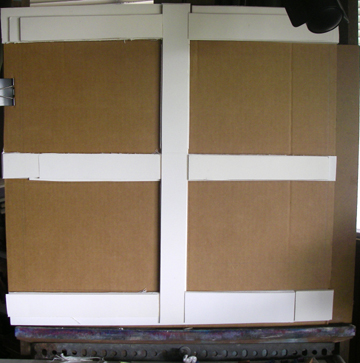 Small canvases are a bit tricky to hold securely, so I designed this sort of tray (bound to be modified!) from cardboard and scraps of Fome-Cor to support the quartet of canvases. I didn't want to have to touch the wet canvases as they were being painted to move them back and forth from my easel. Not if I were to work on all four simultaneously. |
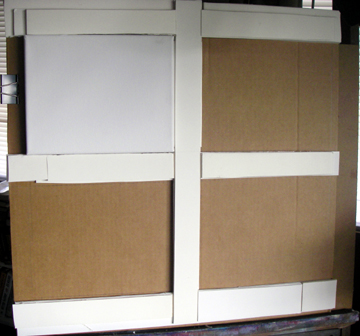 Here the first canvas has been attached to the tray. But I didn't trust it would hold just by being squeezed between the built-up strips of Fome-Cor, so... |
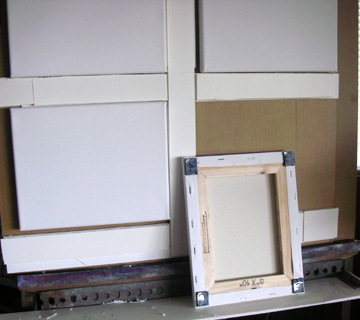 ...on the corners of each canvas are pieces of Velcro, the kind with adhesive on the back. That held 'em! |
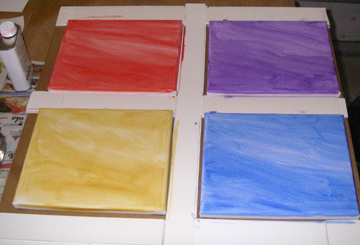 Here's my crossroads. With their tray laid flat, In a well-ventilated area, using artist's turpentine, I washed each canvas with a different alkyd pigment: Winsor Red; Dioxazine Purple; Yellow Ochre: Cerulean Blue. I kept in mind the largest shapes I'd be painting, trying to establish the flow right from the beginning. My daughter said they looked like candy. |
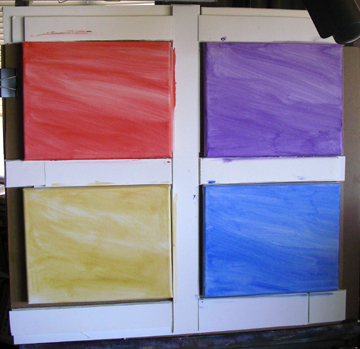 Here's my yummy candy assortment! The backing cardboard of their tray is clipped to a sturdy drawing board. That black thing on the upper right is my Ott-Lite (a wonderful investment for anyone who wants to see true colors at any time of day or night). |
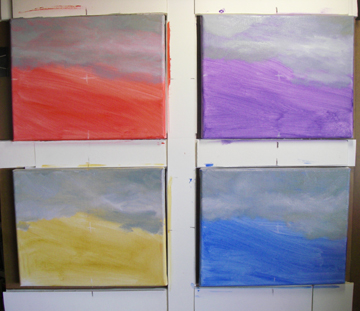 When painting a landscape, it's usually best to work back to front, and to deal with the largest shapes first, so here I've gotten the overcast sky started. I was already pleased by the varying effects caused by the different base colors. I always try to let some of my imprimatura shine through by not painting the upper layers too thickly. |
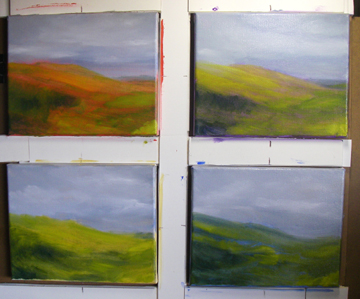 This photo was taken after a long painting session. Although what caught my eye (and never left my heart) was the effect of the cinnamon-hued tall grasses catching the last sweep of sunlight, I still had to deal with the tones beneath this layer. I used the same pigments on all four canvases, and you can see the definite influence of the imprimatura on each! |
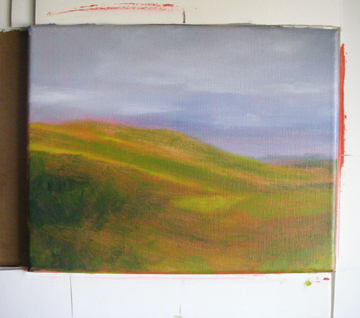 Another Old Master technique I love is the use of glazes to build depth and optical magic. A glaze is simply a bit of pigment blended into the medium; oil painters traditionally use linseed oil, but it takes forever to dry and tends to yellow and crack. You almost need to be a chemist to paint in oils! Fortunately, us 21st Century types have Liquin by Winsor-Newton, the honey-like alkyd medium that dries overnight and forms a tough but flexible film. This is the red version after several glaze applications. |
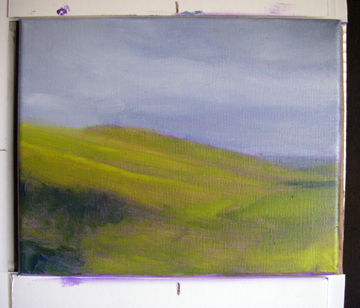 I am very fond of purple. Not that I wear it very much, but in painting, it's the great bridge between warm and cool colors. This photo was taken right after the preceding one of the red-toned version, after the same painting session. It has less of a glow, more of a somber look than its neighbors, due to its purple imprimatura. |
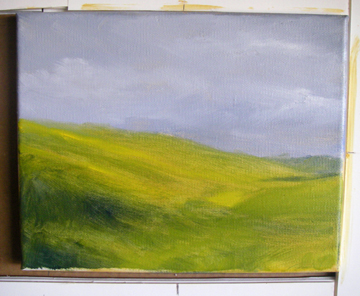 I used yellow ochre rather than a pure, vibrant yellow, due to the overall, wintry aspect of the landscape, which does look a bit too green and summerlike here. The green glazes which looked so mellow on the preceding two canvases acquired a much brighter effect on top of the yellow imprimatura. The countryside was dotted with many fields as green as golf courses, however. The farmers plant cover crops to restore the soil and protect it from erosion, and to grow pasture and hay for their livestock. |
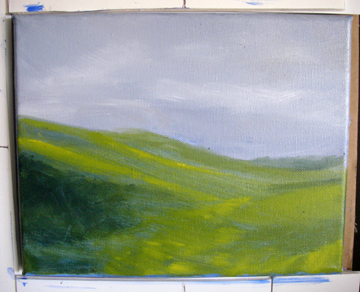 Cerulean blue is a less intense blue, which is why I chose it for this undertone. This painting looks very springlike, doesn't it? Very cool and fresh. This was taken after the same session as the previous three photos. |
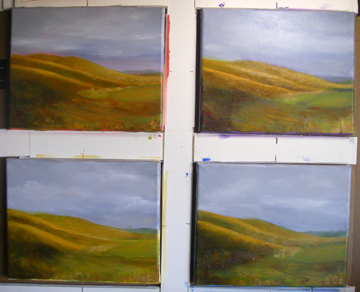 Here's my Tennessee Quartet after numerous warm glazes and scumbles were applied. Scumbles are like glazes, in that pigment is suspended in Liquin and brushed on, but more opaquely. This is just before I added the treeline, which you can see in the finished paintings, along with the cedars and the distant mountains. The foregoing was just to help you learn the basics of getting started; at least, my approach for this particular subject! There is more information on this Quartet on my LiveJournal blog. I learned so much from this experiment that I am warming up my paints and brushes for the next one. Stay tuned! |
| Return to the Finished Quartet | |


Okefenokee Suite Giclées Available |
Botanicals Giclées Available |
Teapot Conversations Giclées Available |
Shell Fragments Giclées Available |
Line Art Notecards and Prints Available |
Water Giclées Available |
Dog Portraits Past Commissions |
Horses Past Commissions |
More Animals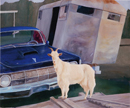 Giclées Available |
Donna's Ark (Whimsical Animals)  Many Products Available |
| Shelter Animal Portrait Project  Notecards and Prints Available |
Quartets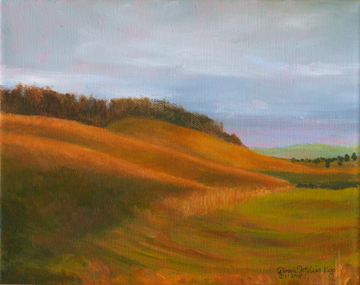 Originals Available |
Photo Contest Submissions and Results |
Miscellaneous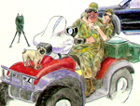 Past Commissions |
Confluence Past Issues |
Home - About Donna - Contact - Blog - How to Order - Artwork Index - Links
This site and its contents Copyright © 2010 Donna M. Kazo.
Proud to be hosted by Green Gator; powered by clean, sustainable wind energy.



